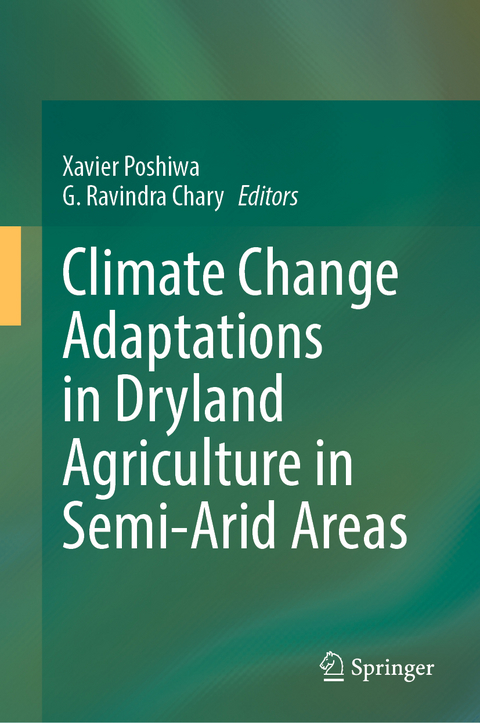
Climate Change Adaptations in Dryland Agriculture in Semi-Arid Areas
Springer Verlag, Singapore
978-981-16-7860-8 (ISBN)
Dr. Xavier Poshiwa obtained his Ph.D. in Rangeland Ecology in 2013 from Wageningen University, The Netherlands. He worked at University of Zimbabwe Marondera College of Agricultural Sciences and Technology, now Marondera University of Agricultural Sciences and Technology as a Senior Lecturer. He was appointed Acting Dean of Studies in October 2014 up to October 7, 2019, and Acting Dean of Faculty of Agricultural Sciences and Technology from January 2019 to February 2020. He moved to Great Zimbabwe University, Masvingo, in March 2020 and is Substantive Dean of the Gary Magadzire School of Agriculture. He took part in various collaborative research programs since 2000. Dr. G. Ravindra Chary is Former Director (Acting), Central Research Institute for Dryland Agriculture, and presently Project Coordinator, All India Coordinated Research Project for Dryland Agriculture in Indian Council of Agriculture Research. He obtained B.Sc. (Agriculture) and M.Sc. (Agronomy) from Andhra Pradesh Agricultural University (APAU), Hyderabad, and Ph.D. from University of Agricultural Sciences (UAS), Bengaluru. Initially, he worked at Indian Institute of Pulses Research, and National Bureau of Soil Survey & Land Use Planning. He has made significant contributions in rainfed agriculture research, development, and policy including climate-resilient rainfed agriculture; manual for drought management in India; land use planning in watersheds; carbon sequestration strategies in rainfed production systems; district agriculture contingency plans for 650 districts in India and real-time implementation; and assessment and upscaling of rainfed technologies/climate-resilient practices.
Climate Resilient Rainfed Agriculture - Experiences from India.- Examining the potential impacts of agro-meteorology initiatives for climate change adaptation and food security in Bhutan.- Climate Change Mitigation: In situ management methods of Indigenous fruit trees in Chivi communal area, Masvingo Province, Zimbabwe.- The effect of temperature and rainfall changes on biophysical and socio-economic status of people in Northern Jordan valley drylands, Palestine.- An Assessment of Meteorological Drought Variability in representative areas of Rajasthan.- Building Resilience to Effects of Climate Change on Food Security: A Case Study of Female Headed Households in Arid Region of Buhera District, Zimbabwe.- Halophytes of Semi-Arid Areas: Resources for Mitigation of Climate Change.- Selection of resilient crop species for cultivation under projected climate change Livestock based production systems for Climate Adaptation in Dryland Areas.
| Erscheinungsdatum | 18.02.2022 |
|---|---|
| Zusatzinfo | 58 Illustrations, color; 23 Illustrations, black and white; XIII, 365 p. 81 illus., 58 illus. in color. |
| Verlagsort | Singapore |
| Sprache | englisch |
| Maße | 155 x 235 mm |
| Themenwelt | Naturwissenschaften ► Biologie ► Ökologie / Naturschutz |
| Naturwissenschaften ► Geowissenschaften | |
| Sozialwissenschaften ► Politik / Verwaltung | |
| Wirtschaft ► Betriebswirtschaft / Management ► Unternehmensführung / Management | |
| Weitere Fachgebiete ► Land- / Forstwirtschaft / Fischerei | |
| Schlagworte | Climate Resilient Rainfed Agriculture • Climate-smart agriculture • food security • Livestock feeding • Rainwater harvesting • Resilient crops • Risk Management • Soil conservation • Solar Drying Technology • sustainable agriculture |
| ISBN-10 | 981-16-7860-X / 981167860X |
| ISBN-13 | 978-981-16-7860-8 / 9789811678608 |
| Zustand | Neuware |
| Haben Sie eine Frage zum Produkt? |
aus dem Bereich


